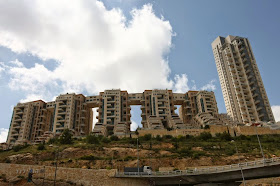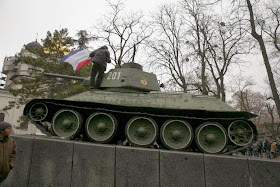by Benson Agoha | Middle East
Egypt reacted quickly against tunnel diggers in a somewhat unconventional method - they simply flooded the tunnel with sea water, leaving all 21 diggers to fight for their lives.
As the men scrambled frantically, reports say Gaza civil defence rushed to save them, abandoning their mission in the process.
 |
| * After the collapse of the tunnel the men were trying to restore in the southern Gaza town of Rafah Najat, 21 workers escaped from it. (Credit: via Twitter/rt) |
Palestinian rescuers managed to help them escape into another tunnel as the new one they were building collapsed.
The group of diggers were caught underground after Egypt flooded the tunnel they were in near Rafah early on Tuesday morning.
Seven of the men were rescued by Gaza's Civil Defence teams shortly after the tunnel was inundated with seawater.
The other 14 workers were later found safe, but it was not clear whether they suffered injuries.
The Gaza Civil Defence said that the group was near the eye of the tunnel that was flooded, and managed to escape to another tunnel during its collapse. They then made their way back to the Palestinian Rafah border.
The workers were rebuilding a previously collapsed tunnel.
On Monday alone, Egypt destroyed 20 newly dug tunnels, saying that it needs to defend itself and its borders from “terrorist attacks” in the Sinai desert, which have caused the deaths of dozens of Egyptian soldiers.
Since the Israeli-Egyptian blockade on Gaza began eight years ago, tunnels have flourished as a lifefline for the coastal enclave's 1.8 million residents.
Basic goods in addition to building supplies have been smuggled in through the tunnels, which represented a source of income for the Hamas government after they began imposing taxes on received goods in 2009.
Following the 2014 Israeli war on Gaza, the Egyptian army launched a military campaign to destroy the tunnels.
“Tunnels are gates for terrorism and external support of terrorism from Gaza to Sinai,” said Egyptian Major General Khalid Okasha at the time.
A buffer zone more than 8.5 miles long was built along the Egypt-Gaza border. The Egyptian army then placed giant water pipes along the border to flood the tunnels with seawater.
The Egyptian authorities control the only non-Israeli crossing to Gaza.
After 100 days of closure, Egypt opened the crossing point for two days on Friday and Saturday for thousands of people who are stranded either in the Israeli-blockaded Gaza or on the Egyptian side.
In 2015, the crossing point has been opened for only 19 days.
The other 14 workers were later found safe, but it was not clear whether they suffered injuries.
The Gaza Civil Defence said that the group was near the eye of the tunnel that was flooded, and managed to escape to another tunnel during its collapse. They then made their way back to the Palestinian Rafah border.
The workers were rebuilding a previously collapsed tunnel.
On Monday alone, Egypt destroyed 20 newly dug tunnels, saying that it needs to defend itself and its borders from “terrorist attacks” in the Sinai desert, which have caused the deaths of dozens of Egyptian soldiers.
Since the Israeli-Egyptian blockade on Gaza began eight years ago, tunnels have flourished as a lifefline for the coastal enclave's 1.8 million residents.
Basic goods in addition to building supplies have been smuggled in through the tunnels, which represented a source of income for the Hamas government after they began imposing taxes on received goods in 2009.
Following the 2014 Israeli war on Gaza, the Egyptian army launched a military campaign to destroy the tunnels.
“Tunnels are gates for terrorism and external support of terrorism from Gaza to Sinai,” said Egyptian Major General Khalid Okasha at the time.
A buffer zone more than 8.5 miles long was built along the Egypt-Gaza border. The Egyptian army then placed giant water pipes along the border to flood the tunnels with seawater.
The Egyptian authorities control the only non-Israeli crossing to Gaza.
After 100 days of closure, Egypt opened the crossing point for two days on Friday and Saturday for thousands of people who are stranded either in the Israeli-blockaded Gaza or on the Egyptian side.
In 2015, the crossing point has been opened for only 19 days.
 |
| * Egyptian soldiers inspect a tunnel in Rafah, along the border with Gaza, in November 2014. (Credit: via MEE). |

















































































































































































No comments:
Post a Comment